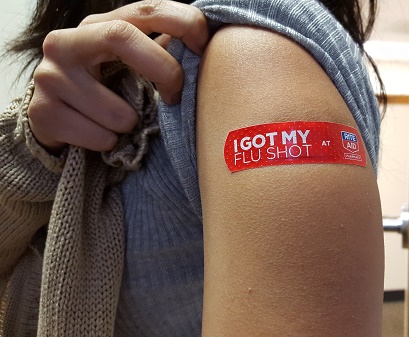Last year was the worst flu season on record. If you’ve had it, you know that the flu is pretty debilitating. You could be laid up in bed for days with a fever, aches and pains, a runny nose and a headache, demanding sympathy from your entire family. You could also have to take up to two weeks off work which can be particularly hard if you’re self-employed. Influenza, more commonly known as the flu, is pretty awful and it can even been life threatening for vulnerable people like the elderly, children or immune-compromised people.
Influenza outbreaks spread around the world every year which results in about three to five million cases of severe illness and about 250,000 to 500,000 deaths.
So we know it’s bad and potentially deadly but do you really know what it is, how it’s caused and how to treat it? Knowing more about viruses, like the difference between a cold and the flu, can really help protect yourself and others around you from contracting them. So let’s have a closer look at influenza.

How do you catch the flu?
The flu attacks the lungs, nose and throat. Like other viruses, influenza is spread through tiny droplets in the air that are released when a sick person sneezes, coughs, or blows their nose. The virus can also live on objects or surfaces for up to two days. So if you touch a surface that someone infected with the virus touched, you can pick it up there as well.
Thankfully, someone sneezing on you on the train (gross but it happens) doesn’t mean you’re definitely going to contract the virus. It depends on when they first got sick, how many particles of the virus were contained in the droplets and a range of other factors. On the flipside, a person not yet showing any signs of the flu could still be infected by the virus and therefore pass it on to you.
How can you avoid catching the flu?
Unfortunately there isn’t much you can do to 100 per cent ensure that you won’t contract the flu but there are a couple of things you can do to try and reduce the risk.
- Get immunised each year
- Wash your hands regularly
- Avoid going to school or work when you’re unwell and encourage others to do the same.
How do you treat the flu?
Viruses are complex things unfortunately there isn’t a quick solution for curing the flu.
The flu is treated primarily with getting lots rest and drinking fluids to let the body fight the infection on its own. Unless it’s really serious in which case you might need to go to hospital and receive antiviral treatments.
Antihistamines can stop a runny nose, decongestants can free up your breathing, and pain relievers (paracetamol and aspirin) can, well, relieve pain and reduce your fever. These ‘over the counter’ medications can help relieve the discomfort of the flu while your body is fighting off the virus. However, vaccines prevent the flu in the first place. Preventions are better than cure.
Why do you need to be vaccinated for the flu every year?
The flu vaccine is constructed from a killed virus (which is why you can’t get the flu from the vaccine) which helps your immune system recognise and prepare for attack.
Every year the flu vaccine includes a different strain, which you may not have already been protected from. The flu virus is very good at mutating, which is why we need a different vaccination each year.
While some viruses can have a vaccine that can last for ages (small pox), the flu is a particularly tricky virus. If you imagine the flu virus is an attacking invader, your immune system is defending you from that particular invasion and the armour the viruses are wearing. But your immune system can only seek and destroy the flu army if they’re wearing the same armour every time. Unfortunately the flu virus is very good at wardrobe changes (those changes are mutations). These changes or mutations can help the virus to evade our immune systems and keep spreading. Each year we need new vaccines to help deal with these new changed viruses.
What new research is being done to protect us from the flu?
As vaccines are our best line of defence against the flu, one of the big focuses for the future is on creating a universal flu vaccine that would give longer protection from the flu. While we currently need a vaccine annually, a universal vaccine would likely last more like five years.
We’re looking into new ways of manufacturing vaccines so that we can reduce the cost and the time it takes to make new vaccines.
In 1996, we developed the first antiviral drug successful in treating the flu. Relenza has been used to treat millions of flu sufferers worldwide. New and more effective antiviral drugs are also a major research focus.
And while prevention is better than cure, we’re also researching new diagnostic tests that call tell us sooner when we are infected. This can help us get the jump on viruses like the flu before it completely knocks us out.
We’re going viral!
We’re heading to Vivid Sydney to give you a peek under the microscope at more viruses.


26th June 2020 at 11:31 am
Covid 19 is also a respiratory virus. The behavioural consraints introduced for the coronavirus should result in fewer flu victims.Hopefully,experience gained with the wide acceptance of the necessity of personal hygiene will not taper off.